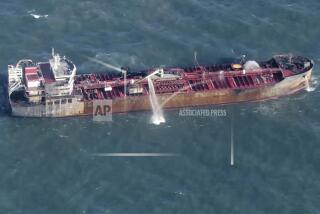Tanker Spill Blamed on U.S., State Officials
- Share via
A national environmental group charged Thursday that neither the state nor federal government have adequately monitored shipping activity at a mooring terminal off Huntington Beach where 394,000 gallons of Alaskan crude oil spilled last month.
“Nobody has been minding the store,” said an attorney for the Washington-based Natural Resources Defense Council, which also alleged that the crew aboard the tanker American Trader was not using the ship’s depth-sounding equipment when it ran over its own anchor and gouged holes in one of its oil-bearing compartments.
Mooring master John E. Keon, the tanker’s pilot when the spill occurred, has previously told The Times that he did not use the ship’s fathometer because in shallow waters such as those around the terminal the instrument is not always accurate.
It took more than five weeks and $20 million to clean up the oil that washed ashore and forced the closure of 20 miles of Orange County beach.
U.S. Coast Guard Capt. James C. Card on Thursday acknowledged that regulations for offshore terminals are not as strict as those for onshore facilities.
“Frankly, we don’t have the same degree of regulations, and that is something we must address,” Card said.
Preliminary findings of the Coast Guard investigation into the cause of the spill were expected by the end of March, but Card said Thursday that it may now be mid-April before results are released.
Card declined to comment on the importance of the fathometer issue, saying only: “It is part of our investigation.”
Lynn Edgerton, a senior attorney with the Natural Resources Defense Council, said Thursday that various factors--all pointing toward government negligence--combined to help cause the Feb. 7 spill from the 811-foot American Trader as it attempted to moor and pump petroleum through an undersea pipeline to Golden West Refining Co. in Santa Fe Springs.
Edgerton said if state and federal officials had routinely inspected the mooring and surveyed surrounding sea depths, which are shallower than indicated on nautical charts, the accident might have been prevented.
The last depth survey by federal officials was conducted in 1975, and in the early 1980s the State Lands Commission, the agency charged with negotiating and monitoring offshore oil and mooring leases within the three miles of the coastline, halted all inspections of the terminals because of cuts in state funding. Annual inspections of marine terminals would be mandatory under legislation now being considered by Sacramento lawmakers.
“There wasn’t anybody out there checking and rechecking the bottom,” Edgerton said in an interview.
Earlier in the day, officials of the Natural Resources Defense Council and a second environmental group, the Center for Marine Conservation, warned that oil tanker traffic is so heavy--the harbors of Los Angeles and Long Beach record more than 1,000 tanker visits a year--that another significant spill is inevitable without stricter controls, particularly at 20 marine terminals.
“We want vigilante monitoring, regular inspections of those moorings,” Edgerton said. “If we are not going to get them, we want to talk about eliminating those moorings.”
As the two environmental groups leveled blame on government officials, the Coast Guard and State Lands Commission announced plans for a joint study of operating practices at marine terminals. Charles Warren, the Lands Commission’s executive officer, said ocean depths, weather and sea conditions, the use of tugs to assist large tankers, oil spill response and availability of oil recovery equipment will be addressed.
Times staff writer Larry Stammer contributed to this report from Los Angeles.
More to Read
Sign up for Essential California
The most important California stories and recommendations in your inbox every morning.
You may occasionally receive promotional content from the Los Angeles Times.












